#Diversity in fiction
Explore tagged Tumblr posts
Text
The Bad Week on Twitter in publishing and possible SOLUTIONS to the problems discussed.
"I’m sorry, not sorry ’bout what I said Don't lose your head" --Anne Boleyn, Six, the Musical
Twitter updated their software back end to handle more images, so I added the full text and images into this post.
I’m aware of the fact by doing this post someone is going to say: “You hate all agents, the entire industry, you hate me, and you know nothing. I’m black balling you.” simply for doing this post or try to find solidarity, but I’m begging with a bunch of other writers that we work together on a problem I know we all collectively see. I’m doing cold reporting as well as trying to find a way through to bring us together. And this isn’t the first time I’ve tried to do this.
My personal dream is end to end diversity in the bookstore/Library without question. Indie and Barnes and Nobles alike. I was highly affected by the lack of diversity in my childhood, and it’s a gap I want to fill/be filled. I’m hoping you dream it too and are willing to work with us to achieve better numbers and better faith. I want uplift, not only for myself, but others in my position. This has sections, I’m going to be the tdlr; first. The sections are:
tldr; get the point already
Me and previous activism so you have some faith I'm not here to yell and you know that I have some clue about the publishing industry. I'm just the messenger don't shoot me. I'm solutions-oriented.
History of the Diversity Movement (as I know it)
Statistics
This Bad Week in Publishing on Twitter
Tangible Solutions to reach our goals.
To be clear, I'm here to report, but also use my anthropology degree in systems to try to improve the system and show everyone what we see on our end, so that hopefully the whole industry coordinates so it's not authors/writers v. agents/publishers (the people)/publicists/booksellers/editors. From talking to other authors pinning their hopes on trad publishing, we, too, ache for cooperation. And what we are hoping is that industry professionals will help us with that so we can achieve and fight for it together by extending empathy and cooperation.
I, personally, understand how asking for change feels like it might be hating you, personally, but I think the point is us coordinating together to better serve the readership. Shouldn't we focus on that?
The rest of the post is here because tumblr wouldn’t allow me to post all of the relevant images:
Too long, didn't read, get to the point already
Authors/writers are confused because what we see on our end are these statistics from Pew Research center:
Since 1980's cishet male readership has slid to lower and lower with a lot of articles speculating why, but publishers try harder to bring them back. The last numbers sliding to as much as ~80% women ~20% men readership with as much as ~90% women as serial readers.
And Black College-educated women being the now principal readers. We unfortunately don't have disabled readership numbers, but I speculate those numbers are high.
It's what sells, but we aren't given numbers on your end, so from our end, we're trying to fill a market you won't sell to, so we feel frustration. Wait, aren't we selling to a demographic that really loves diversity?
What we want is numbers from your end so we can UNDERSTAND WHY. It would also help us generally with comps, etc. We're willing to do the groundswell work to ask bookstores and readership to also pitch in. Just come and talk to us and show us what money is generally being put into a diversity book, and also give us the freedom to prove to you we can put out our most creative and sell it. We're not asking for laziness on our end and you do all the work. We're asking for cooperation and transparency.
Some background on me because clicking the profile is so hard:
I've been studying publishing since I was 13 years old. One of the first bits of advice I ever got from Writer's Digest was: Writers need to know contracts and the industry too, to protect themselves. So, I've done my best to keep up.
I've worked as a production assistant at a publishing company--though for translated works, which included editing and compiling Product Bibles. I got in by contacting the head of the company with editing mistakes (I was young and I didn't think much by doing this--I wouldn't recommend it usually. The young are brave and occasionally a bit thickheaded). I also bothered to write a rejection for someone as well.
I know the process and have listened to hours of writers telling me how it works and read blogs back in the day religiously. I can give you a history of publishing from the roots of China all the way to present day in staggeringly geekish details. You don't want to try me because it's a book.
I've read books and watched movies *just* to understand why that piece of media was hated or loved, watched countless reaction videos to books, movies, pop culture from around the world, so I can keep tabs on not just the US market, but the world market. I've collected tidbits about how other markets work and why. I wouldn't have done that without a really deep love for this industry. No one else really would care exactly how publishing is changing in Japan under the pressures of the internet in the US except industry professonals.
I've also tried over the years to find solutions to social justice problems:
I used to make every year for Nanowrimo lists of resources to write diversity until the moderators got upset one year and locked all the threads. I put my neck on the line for that. This was, BTW, long before "We Need Diverse Books" was a thing. I got a lot of hate for simply compiling the list of resources. (That was all I did and people breathed on me for it.)
I worked on the rehoming situation for the boy that was in Ohio. I sent a bunch of people to pressure the governor and sheriff's department about his welfare. And we got a result; China is going to quit adopting children out to social influencers. Holt also reconsidered their policies because I got adoptive parents, adoptees and the general public to cooperate on a single goal. Up to that point social influencers were using his situation to get money and comment on it, but not do any actions to solve it. BTW, the boy also ended up in a better situation as police followed up and made sure.
I tried to work on the communication problems with adoption in Korea.
I was the one that asked that PoC Agents and Associate PoC agents get credit on the agency listings so they could move up the world for more transparency. This caused a ground swell and now it's standard practice, with more PoC agents getting promoted as a result. I was sure I was going to get hated for that too.
I also questioned the whole "PoC/diversity fad" thing, though I'm not sure if it was completely from me, but I was one of the voices that asked is this really necessary after mass trauma? What should mswls look like for diversity?
I had a thread on why your book would be banned in support of ALA's Banned Book week to get people thinking in a fun way about the impact of banned books and if it is possible to ever write a book that won't get banned (and the answer is no.)
I also did a few loose surveys on number of rejections before being published and a general writer survey on Nanowrimo to get a sense of the demographics (The long questions list was so writers could practice interview questions and help those who had school projects on Nanowrimo.) I learned a lot from running those surveys, such as how to respect other writers and if identity correlated to how likely someone was going to get published.
I've also tried to help authors/graphic design artists, etc with reading contracts on occasion too.
My activism has been minor because I have limited wavelength for drama, but I've done my best to contribute something *positive* rather than merely pile on. I also backtracked claims (Fact checking is something I do frequently) and tried to posit solutions to problems with cooperation. I did a post on what writers would love agents to have as policies by working together with an agent and writers and talking it through. I *love* cooperation.
Full disclosure: I've been through a lot of trauma, and I'm drama phobic, but it's also made me very focused on less accusations and more solutions. This is 100% what I'm looking to do. Bring groups together to attack a singular problem. BTW, I'm not saying my solutions are perfect. But can we talk about it and work on it together?
History of the Diversity Movement (as I know it)
Agents
According to On Writing by Stephen King, it rose in the 1970's -1980's... so it's a relatively new profession. He was deadset against agents, saying that hiring a contract lawyer was more effective. But as I'll cover, there were solid arguments for the need for this profession.
Before 2009
So after the 19th century, a bunch of white men pretty much locked out a bunch of women and diversity voices by saying their writing was inferior in a variety of ways (lol I'm working on a nonfiction book about this--well a chapter). This caused issues pretty early in the rise of the publishing industry as the tech to reach the general public got better. A lot of the fiction for (white) women was relegated to being either "trash" or "Literary" (which is the fate of a lot of PoC written for PoC books.) TT I don't have stats for Diversity books.
However, the internet hit and people that were previously disconnected found out that other people thought the same thing, and the industry shifted significantly as self-publishing became more viable than before. An industry also rose to try to meet the demand, but this left traditional publishing in a lurch.
But on the diversity side people could finally ask questions about representation and connect to other authors like them.
2009
There was a groundswell after The Mammoth Book of Mindblowing SF had a controversy, where the authors were all white cis male. This controversy hit Nanowrimo and then exploded from there. NK Jemisin said that she probably wouldn't have had her books published without it. <3 (She helped me as I helped her, but I'm not saying how I know that.)
There was adult books being published as well as YA of different backgrounds. We got Saladin Ahmed from that... and then...
We Need Diverse Books
came out. And then all of the diversity was stuffed over time into YA. Part of it was their fault as they gave up on Adult demographics books, and part of it got heat for chasing only authors. Authors felt like they were getting chased out of YA. Some of the reporting was terrible (I'm looking at you Publisher's Weekly. You know what you did, which is why you needed to call for a PoC editor after my call out).
Some people in the We Need Diverse Books movement are mad at me because I asked them to represent Black people and adults, and do better with adoption presentation... and questioned why they chased after only writers, not publishers and the industry as a whole. (As I said, my jam is cooperation as a whole)
There were also general quibbles from writers about how they were doing this, and trying to do upfront censorship, limiting things, but that's a whole mess to explain.
Because of college I had to step out for a while... so I don't have the nuanced beats from about 2017-early 2019. However, what I do know is that as writing moved to Twitter, writers didn't like how it was focused all on writers doing better and the numbers not changing on who got published. At the same time I was watching librarians cry over the fact they were not getting the books they wanted. Sure, for children, but where are the rest of them? Book covers, after prominent figures stepped up improved greatly (because I do a self report every year since I was 13 because I super take this seriously.)
2020, pandemic
So after a bunch of academic learning about systems, I took a look around and decided to challenge a few in minor ways. I'm sure it got me blackballed for asking that PoC agents get listed, but I thought it was small systemic change that was manageable.
I missed the whole conversion to comps thing, which I probably would have challenged earlier had it come up. (Anyone have the tea, give it to me... ‘cause I really want to know...)
So here we are in 2023, and asking questions such as, 2009, 10+ years, the numbers haven't changed.
Statistics
https://nces.ed.gov/naal/lit_history.asp
This source said it was roughly the same in the 1980's, but male readership significantly has been declining since. I checked numbers in the early 2000's and at the time, the writer population matched the reader population at about 60-40. (Nanowrimo surveys of the time) Pew research center suggested similar numbers in early 2000.
Editors proudly reported in the same time period they did a 50/50 split on male to female. TT Did you not check the market numbers?
By 2021, this had slid significantly to an ~80-20 spread and ~90% of women being the serial readers. (NBs not included)
https://www.pewresearch.org/short-reads/2021/09/21/who-doesnt-read-books-in-america/
This was so significant that the Atlantic reported: https://www.theatlantic.com/culture/archive/2014/01/most-likely-person-read-book-college-educated-black-woman/357091/
Since 2009, there have been health of the industry reports on mainly LGBTQIA and PoC, though occasionally on ND and disability (We need better stats for that, just saying it would be useful to know).
Here are some of the ones I know:
https://reachoutandreadmn.org/news/blog/diverse-childrens-books.html
https://www.booknetcanada.ca/blog/2019/7/18/who-are-the-characters-in-your-picture-books-diversebooks
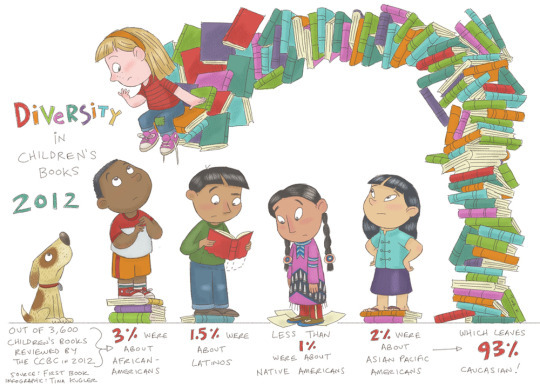
https://www.slj.com/story/an-updated-look-at-diversity-in-childrens-books
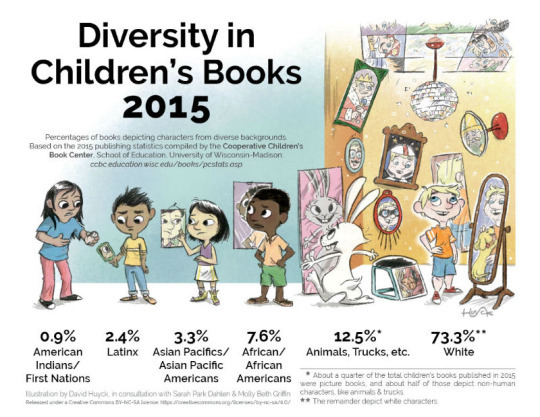
https://www.slj.com/story/an-updated-look-at-diversity-in-childrens-books
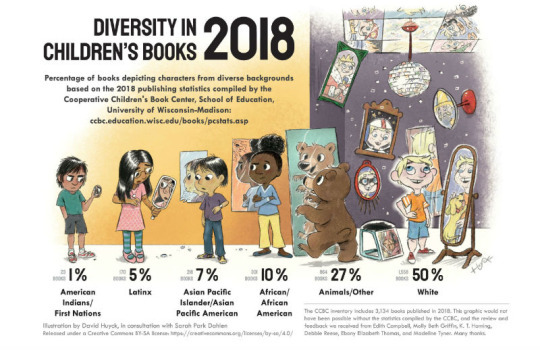
https://www.slj.com/story/an-updated-look-at-diversity-in-childrens-books
I've also seen general statistics, but those are harder to dig up, which has reported that nothing has changed, except, look, the really needy group who can't read gets representation, animals. While Librarians were BEGGING the industry to fix it, the industry took it as a sign to back away from race-related issues. That's what it looks like on our end. The ALA has our backs because every year they do a report on banned books and why they were banned highly discouraging it.
Women as readers, especially liberal (and more recently Black ones) are more likely to like diversity issues. Women make up mothers trying to change the next generation of boys so they don't end up as toxic men, they also fought for civil rights. And Black women were at the head of the LGBTQIA movement, several civil rights movements, etc.
So if authors/writers see these statistics plus Twitter's Publishing paid me, it feels like on our end, that trad publishing doesn't really care what readers want nor what writers want. They want to publish white straight abled books or bust despite the statistics, and agents are willing to cooperate with such notions by closing ranks and telling us, "That's what sells." But since the rise of the Self-publishing industry, the self-publishing industry is saying that's not true, so we, who pinned our hopes on distribution and help with international markets feel a disconnect. What's going on in traditional publishing that you're ignoring the market? And thus, this brings us to...
This Bad Week in Publishing
First, I have to state, if you take these names and try to harass, doxx, or otherwise do nasty things to them, I personally, will not condone it, and in general, it makes you a terrible, terrible human being when the focus is on the future and trying to make concentrated change rather than blame.
People hate change. Our job is to convince them we can do better.
I'll state this over and over again, the opening tweet wasn't about manuscript wishlists.

https://twitter.com/JayMoneWrites/status/1655351493724188673
The original tweet was asking agents to back off telling writers how to write stories:
For example (mine, not Jay's), you HAVE to use the 3-act conflict narrative or it's a BAD story. Wait, I've been doing studies on that and that's not true. Inciting incident is from a Jew (cries as a Jew) who seemingly is super racist. I'm sure the agent doesn't know that, and some PoC story structures are older in history (also the agent likely doesn't know that.) But this is problematic as it comes off accidentally racist and formulaic.
But then there was this bad take, which might be confusing the subthreads, but should have taken from the subthreads:

https://twitter.com/chronicles_of_n/status/1655562727417323525
The subthreads talked about mswls:
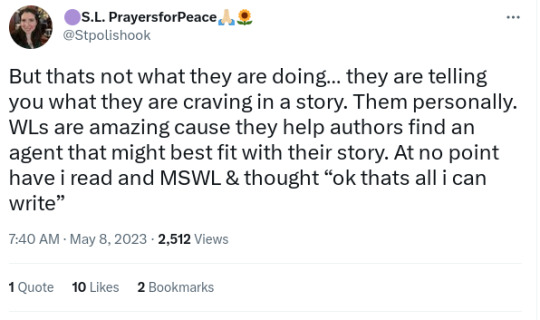
https://twitter.com/Stpolishook/status/1655583477885018120
I own I'm in this subthread, trying to argue that agents aren't "Helpless"
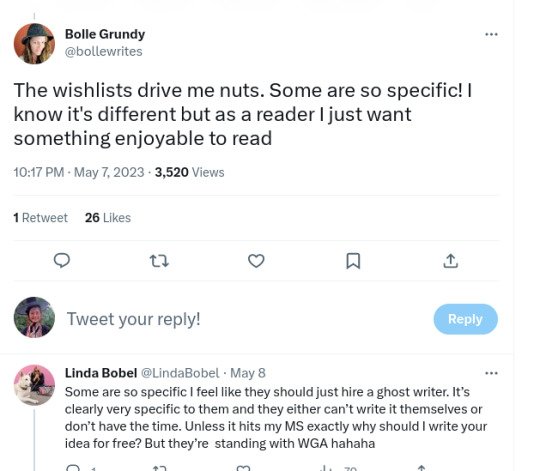
Subthreads also lamented agents asking for shorter and shorter page counts and more specific story structures:
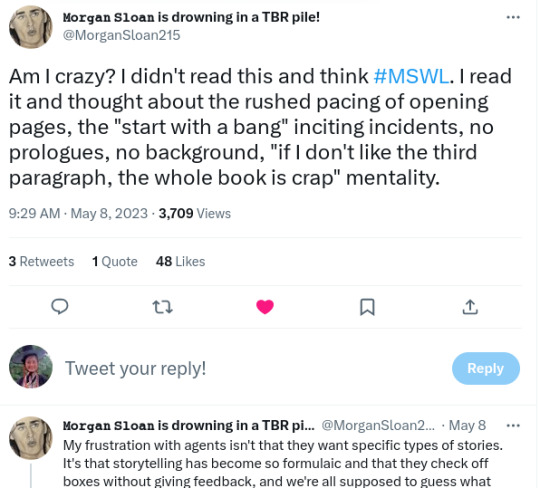
https://twitter.com/MorganSloan215/status/165561094842891469
Also a subthread on comps and setting trends:

I know agents could take this in 2 ways:
That's fair. I could see how this feels like a personal attack with the questions arising and no solutions presented. But no one paused to ask how much industry/knowledge experience any of these people have.
And this is what I see. People are asking a lot of whys, how does it impact the market, make us understand the market. Is what you're posting really driven by the market?
Agents took it the first way, not the second way, unfortunately.
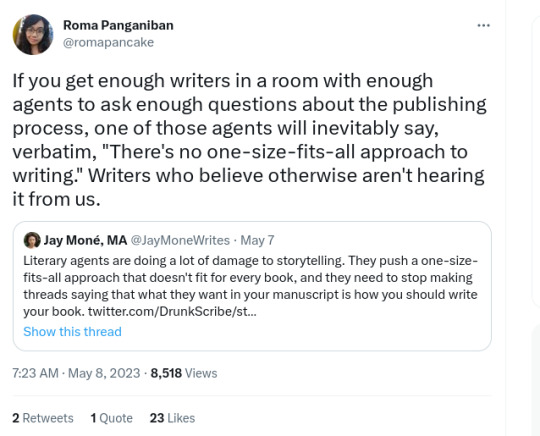
This is a general, not specific answer to the questions inherent above. Is it backed by marketing or not? How much do agents know?
It's saying "it's someone else's fault, not mine. I'm not going to help you with your quest."
Authors disliked this take because it seems like agents are as clueless as authors and we asked shop questions.
Also kinda feels like mswls are personal wishlists because the question wasn't answered: are you taking it from marketing info or not?
Another Agent said if you don't like trad publishing, self-publish:
https://twitter.com/ChelseaBigBang/status/1656069239168434184
I get there were hurt feelings. "And you all hate us, and you don't understand." But the very fact from our POV is we're trying to understand the justifications for it. So the people who want to trad publish, or were entertaining it, especially the diversity writers felt like the people in the list who liked the post were against us. Because the majority of the writers are from diverse backgrounds where "cookie cutter" plot arcs won't work to describe what we're trying to achieve.
Hurt feelings continued when an editor said this:

And writers asked for the same courtesy from agents that ghosted them, and agents vilified the writers. The frustration was reaching a boiling point, because the initial questions weren't being answered at all. Agents wanted something they weren't willing to give back.
Then this tweet happened:

https://twitter.com/SBLitAgent/status/1656429611645906945
This made people really mad and I think some of the anger was unjustified because it was misdirected, but if you have a really important series of questions about the market you want a career in, you want to understand, and someone says, "Well, I make a living from it and you don't. I could be rich doing this, and I really don't care about books. and we know better than you and we're not sharing our information. Live with it." How would you feel? But you asked a valid series of questions about how decisions are made in the industry and you want to innovate diversity stories on top of it. Are they justifying it with market numbers or not?
And really, agents closed ranks, rather than saying that's not cool, which sent writers into another tailspin. Do they not care about us anymore? Why won't they call out this bad behavior and say they will protect us? Why not disavow this agent who says we're just a paycheck? I thought we were in this together. We get you have to work together, but do you really want to close ranks for an agency that says:"if it's too difficult for grown-ups, write for children" https://ktliterary.com/
(Which isn't a call out, it's more like why support this agency saying this about authors?)
Bigolas Dickloas
https://www.insider.com/bigolas-dickolas-wolfwood-trigun-interview-time-war-2023-5
proved some of the adages and the writer's asks as true from our PoV. We can't sell the books on our own. We need other people to support us to get there. And that it's not the length of the beginning pages, as asserted, or the structure, but readers enjoying books and recommending them.
Bigolas Dickolas is a what? Anime fan. And a lot of anime is what? Kishotenketsu. Do agents know that?
So there was celebration that this could be done. At the same time frustration because look, huge fan of anime, and you won't let us have the freedom to tap into the different like anime.
The cover thing...
The cover debacle.
From a pure writer's perspective: So you don't want even spent money to make copyrightable covers anymore? Why are we going for traditional publishing?
I should note that most writers have no hand in their covers. Don't chase down, discuss, think about it.
There is nothing more delightful to a new author than showing off their unique cover that shows what their characters looks like and all foriegn iterations. Many authors are also artists. And we, too, dream of crying, literally tears down or faces at seeing the achingly beautiful covers of our books. And supporting our fellow artists. Because solidarity all the way.
From a personal graphic designer's perspective, we work so hard to make covers and images for you. I used to cry in utter delight at Michael Whelan covers. And daydream about having a cover by him. There's other covers that you can hate the book for, but can't imagine a different cover for it and spend hours admiring the graphics design. As a graphic designer, I'd want that for authors. I'd want them to cry and slowly understand why a cover is the way it is--I mean I made a whole post about covers.
So imagine our disappointment at seeing this is a thing. And you realize you can't copyright an AI image, which puts the cover into a precarious position.
What writers see about Agents
Early in the internet, there were blogs, such as Miss Snark, and others which helped with contracts, how to send a query letter, what's good and Bad, Janet Reid, and agents talking about the business side--that really helped writers and there were long threads about how to approach publishing after Nanowrimo and on other forums, such as Absolute Write.But we don't see that... writers are clueless on how to read contracts, and agents are leaving us high and dry sometimes. Because that's useful info for writers to know. Are there particular weasel clauses we should think about these days? Match this dearth with the attitude above where you're supposed to care about us for more than a paycheck, and how do you think we feel? We pin our hopes and dreams on publishing because we love it, we struggle to try to understand the business to make ourselves attractive, but the backstab is deep when you won't talk about the industry and numbers with us. There's a disconnect.
Miss Snark used to say, hit me with your most creative, no matter what and I'll do my best. She liked to say, "Knock my socks off."
She also said, (between her poodle) that her colleagues would get on her case for doing it, and share how hard it was being an agent, because she'd have to read manuscripts on the way to work. We see your struggles, too, but with the above tweets, the question was, do you understand ours? How much are you willing to help us to the finish line? We know how it works.
Some internet troll is going to misconstrue this as a way to hunt down agents... but she's a fictional agent and retired, so...
We want you to sell and sell hard, but also sho off your selling prowess and innovate the industry. Our books don't have a market. We know that, that's why we're asking you to be our partners--agents editors, and publishers to help us prove we can innovate it. You don't have to be alone.
Demographics of writers
For diversity writers what we were promised from the age we thought, "Hey, I'd like to be published" is, "Ah, this will be an industry that doesn't judge me for things I can't control and we can create empathy for people like me together." And then there is a big shiny sign that says, "Hey, kid, I believe this too. Let's work on this together."
This is the greatest power of books that we were promised from a young age. If we grew up around "We Need Diverse books" then we pinned our deepest hopes on this. We could revolutionize the industry if we understood it deeply enough and worked hard enough to become better writers.
We were told to red everything and consume as wide as ossible, over and over again, but we don't know and can't put our faith in that industry pros are doing the same. I know this sounds like an accusation--it isn't. We just want to talk about what you do and don't know so we can share the info and help each other out.
The writer demographics match the reader demographics by and large, and as avid readers, we also want to reach the same market as the industry pros. We also know the market and are trying to reach it. It's not only, OMG, hobby, let's publish. Some of us try to keep faith while the industry says they hate us. Because we dream of social change towards us and people like us.
The reader demographics tend to match the writer demographics: I ran the survey for 5 years and cross referenced it with Pew research center in my time I'm struggling to find their older studies). So there is more frustration when there are more and more diversity writers around, from our PoV (taking out the internet self-selecting), and still no change in books.
So imagine people like that hearing that too bad, we're not going to share marketing information with you? How would you feel?
Yes, angry, disappointed, but I thought you were on our side~ Why can't you answer our questions? And to be told too bad, you're whining... we make the rules... what does it look like? Can we move forward or not?
By and large, the majority of PoC and diversity writers are POOR and need the support of big publishing to cover the upfront costs. The people who have the spare cash to do self-publishing--pay for editors, reviewers, covers, ISBNs, etc. And we see the market for our books, but trad publishing is still chasing after that elusive white cishet abled NT male.
The FAQ writers have:
- Marketing numbers to back up the requests from agents/editors.
Can we also see them? Why close ranks and say they are industry secrets?
- Is the 10 page count justified by statistics? If so can we see them? Or if it is convenience?
Convenience for the agent or are there market forces at work?
- "It's what sells," what are the numbers to back this up?
- Can we have a conversation about innovating the market, making trends and comps? And if we can go back to elevator pitches?
- Why often pitches and asks for them in public don't result in the agent getting back to us.
- Are there marketing numbers to back mswls, and specific requests? Can we SEE them? Are they whims, or really backed by the market? Can you back it up and SHOW us why you think so? Or was it because it occurred to you over morning coffee and you want to read the book, but not write it? Was it an editor? Writers are hungry to learn about the industry too. Contract help, for example.
- But sometimes the hyper specific mswls and saying and declaring "Trauma doesn't sell" when it was a specific request doesn't feel like it's coming from marketing advice since we have Encanto, Everything Everywhere all at Once, and Turning Red. (I'd mention authors, but I don't want to give them heat.)
- Can you also post more about contracts, loosely. Agents used to boast about particular weasel clauses and how they got a 5% boost on a sale because of X thing. We like that. We love that.
- You know that the paper catalogue back in the day just said genre, send it. Because you have about 30 words to cram into it. But now there are thousands of ways you want to send the manuscript with no clear set rules and it drives even the most neurotypical person into a panic attack as they try to look for the nearest crystal ball. It used to be uniform. Can we get set guidelines similar to what I posted and TALK about it?
The disappointment sometimes turned into disgust as agents didn't talk about it to protect their own, but how would you feel if you've pinned your hopes and dreams your entire life on the joy of books we thought you shared to find out that you won't and can't fight with us and even like the post and appear to feel the same by liking the post saying you're our source of cash? (Especially when those agents claim to be on our side in the diversity struggle and they share the same diversity too.)
We, who wanted to be published with you, are working hard to understand this industry too, so why lock us out like we're less than and not intelligent enough to understand the intricacies. Why can't you talk about it instead of taking it as a personal insult? That's the question rattling around. We wanted to talk shop with you.
- Why do the publishing statistics not match the readership?
- What do you mean by "What sells?" Can you justify it with some market information? It feels terrible when you won't tell us why. Can't we share marketing info?
- We thought that one had to either set a trend--in which case edgy books or be ahead of a trend, rather than follow it--writers are confused on this front. We were told explicitly to not follow trends because by the time we do, they'll be gone. Sometimes it takes a year to write a book. So by the time you see it, it might have been around for 2 years at minimum. Diversity books take longer and we all know it.
- Writers would like more uniform or at least clear submissions guidelines which can be found here: https://www.tumblr.com/kimyoonmiauthor/685983497588965376/how-literary-agents-can-help-neurodiverse-people?source=share
BTW, if you have objections, voicing them in a professional way would help me refine the list. I worked with an agent and several writers for that list, and it would be good for everyone.
- We have questions about trauma representation that have gone unanswered by industry pros and often when we ask them we get blocked?
Diversity writers have questions about the same things in publishing. Can we discuss it?
Some of the ones I've seen are why agents are against covid, but want diversity trauma so much, and why can't you ask for nuanced takes and diversity joy? And then follow through? We notice when you don't get a new client after asking for a specific diversity client.
- We have questions about all these quotas we hear about.
"We have a Jewish writer, we don't need more" "We have an X, we don't need you.".
So are our manuscripts being assessed on merit, or by filling a quota, where the rest of the quota is filled by people who don't have diversity to hit phantom numbers like 50-50 male/female though the writer's population matches the reader's population.
- Also foreign markets and the US markets aren't the same, yes, but why are they jumping so drastically forwards, and we aren't? Can you talk shop with us about it?
- Can you allow more diversity of story structures and ways to write a story?
From our end we see things like anime fans talking avidly about their favorite anime, which uses kishotenketsu and jo-ha-kyu, and Korean drama fans who like shows that don't use 3-act structures and do things like Dream record with high viewership. We see things like Bollywood do a complete 180 in 10 years and then look at the West African market in books and television and find they are playing so hard with story and we want in--especially as own voices. We see Encanto take off and do well. We want to tap that market too, and please our domestic readership and international.
In our bones, we know braided narratives so well, that even if they don't have a name in our heads, we produce them anyway...
and we're told: It's not marketable.
https://www.kimyoonmiauthor.com/post/641948278831874048/worldwide-story-structures
But Everything Everywhere All at Once was publicly called a kishotenketsu (Though I felt it matched more closely beat for beat with qichengzhuanhe--I suppose one could debate that), and people were explained it and felt it in their hearts. And Encanto was a Braided narrative with different parts coming together. And there are motifs that our core fanship would recognize, say the old man that is an herbalist from Chinese tales, with zany ideas who helps the hero/heroine out of a lurch (like falling off a cliff and not getting that broken.)
I get it, though, it feels like a huge risk to be able to invite more structures and more story types, but they managed it in the early 19th century with ONLY US-invented story structures. People won't be that confused. What it feels like to writers is that you're not giving us a chance to really dazzle you and show off our understanding of the readership. But we were hoping you, too, loved the media that was prevalent to us when we were growing up and you also wanted change.
We want to be able to tell you a story about being disabled from an own voices POV, and rock your world with how it feels such that it blows the stereotypes out of the water and nuances it so deeply because it's not really about the disability in the end, you walk away from the book stumbling. Don't you want that too?
We want to share our joys, sorrows and let our creativity soar and meet the market *we* see and work on this problem together, so can you see our confusion? Transparency will help with that. Show us the marketing justifications.
Writers also pay attention to markets and passions too. We aren't ignorant to whims, we try our hardest to be plugged in, because it's also our necks on the line, our names on the book, and we aim to do well for the readership, ultimately. We are hoping you are hoping to do the same. We have customers to serve.
I know these asks seem like "You hate all agents" No... that's not the point. We want to understand and talk shop.
Actions to do together
If you want diverse clients, we won't hire you if you sell these.
PoCs also largely have solidarity with each other, so you have a PR issue if you betray one group, because the other groups won't trust you either. Also, why. Also, we appreciate agents that condemn it and say no.
Do everything in this list to set some industry standards and encourage your collegues to do the same: How literary agents can help Neurodiverse People (and everyone) query If you have questions ASK. I like feedback, it's my job. If you don't want it to be public, tag, me let me know, you can use the tumblr ask function and be anonymous and ask me not to post.
Agents that implemented it did it in less than 24 hours. If you are busy, maybe a week, but it's not hard asks.
Worldwide Story structures If you're not educated, then we can help.
Transparency and communication
On our end, we can work to prove the numbers you have maybe are wrong and there is more support for the movement than you think. That you won't have an epic fail if a Japanese own voices author uses Kishotenketsu in their story structure. That someone from Nigeria might have a different understanding of story and it won't fail. Show us the path and what numbers we need to meet and beat to show it won't fail if you're open and honest with us.
There's marketing discussions to be had on this. Maybe we can help work together on a better marketing plan. We can't help you, if you don't communicate with us about what you see and don't stop saying we know better than you. OK, spill, share. Give us the info we need to understand without saying you're superior. We all started somewhere--you did too, you weren't in the womb knowing how to publish a books and the market. Give us the leeway to learn and we'll do our best to also cast out people who aren't there for a friendly conversation and asking about how to work on it together.
https://www.tumblr.com/kimyoonmiauthor/685983497588965376/how-literary-agents-can-help-neurodiverse-people?source=share
Conclusion:
Communication, honesty and transparency are minimum risk. If we work together to make it happen, I think it will. I know that people promote the conflict narrative and individualism in publishing stories--though as I outlined, I think it's more nuanced, but people LOVE stories of cooperation too. And I think we could achieve it if agents, editors, publishers (the people, again), and the writers work together to achieve goals to meet the market.
Remember, a lot of us pinned our hopes on the love of books and stories, some from the age of 2 or 3, and some from the age of a teenager. We want to fight with you to make this the best industry around and kick other country's butts so we look like the most innovative on the block--are you willing to join us?
#agents#publishing#state of publishing#diversity#diversity in fiction#Diversity movement#editors#publishing pros#queries#mswls
13 notes
·
View notes
Text
It wouldn’t be historically accurate for my story to include BIPOC!
This is an argument often made about European-style fantasy media like Game of Thrones, Lord of the Rings, and Disney’s Frozen. Audiences, often white, assume that due to the majority-white setting, adding any visible number of BIPOC to the story would be unrealistic.
What these critics fail to realize is that BIPOC do in fact live, and have lived, in these settings, and records of BIPOC presence in places assumed to be majority-white have been buried, written out, or not taught due to white supremacist and/or colonial bias in the field of history. There are historical European settings that were far more diverse than is often portrayed. Consider:
The Moorish Empire exerted an extensive influence over life and culture in Southern Europe from Spain from 711 to 1492
The Ottomans were heavily involved in European affairs up until the treaty of Karlowitz in 1699, but still considered a part of Europe even through the 19th century
The sheer size of the Roman Empire ensured the continued movement of people from various backgrounds within the Mediterranean well until the end of the Byzantine Empire.
“Historical accuracy” should not be used as an excuse for media to be exclusively white in its casting. While there are places which are or were predominantly white, there will always be factors like global trade and immigration that bring multiculturalism to their doors.
And even if the presence of a certain demographic is unrealistic for a certain setting? Consider that we’ve accepted far worse inaccuracies in historical fiction in the name of artistic license. Consider that our understanding of human history is, and will always be, incomplete.
Further Reading:
Historically Diverse London, “Historical Accuracy,” and Creator Accountability
Making a Black Pride and Prejudice Resonate
---
This Q&A is an excerpt from our General FAQ for Newcomers, which can be found in our new Masterpost of rules and FAQs. If you're new to Writing With Color and/or want more writing resources, check it out!
-Writing With Color
#writing with color#writeblr#representation#poc representation#history#historical fiction#historical accuracy#writing advice#writing tips#writers on tumblr#diverse books#diversity matters#faq
3K notes
·
View notes
Text
i'm kind of late to this but i just finished reading the scholomance trilogy by naomi novik and i feel like it is such an underrated urban fantasy?? taking the chosen one trope and turning it on its head with a fmc who has been prophesied to bring death and destruction, who is imbued with terrible power, but cannot even properly use said power to solve any of her obstacles because it would obliterate them and her soul. it takes a tired trope and the idea of an 'overpowered mary sue' and throws it back in your face by showing how all the power and destiny in the world is useless against a system filled with corruption that has burdened you with an easy way out (evil/destructive magic) that you can't take so now you have to work twice as hard as everyone else just to do simple, constructive spells instead of flicking your wrist and being done with it.
#the scholomance#naomi novik#galadriel higgins#orion lake#bookblr#urban fantasy#a deadly education#the last graduate#ya fantasy#the golden enclave#ya fiction#it has a diverse cast#queerness just effortlessly woven in#and the entire thing is so seamlessly crafted with a narrative on what real change looks like#how to really rid your environment of corruption and change society for the better you have to do the gritty work#you have to be willing to do the unpleasant hard grueling organization and working with people / meeting them where they're at#you might not even get to see or do the pretty parts#but its still worth doing the distatesful shit#doing the compromising and giving space for people to learn and make up for mistakes#so that future generations can do better#and have the childhood u didn't#no spoilers in case by some miracle i convince another soul to read this but like#she legit fucking says it in the book#it's not the work she wants to do in the end. not what she envisioned. but she does what she must to make sure other kids don't suffer#makes me think of climate activism so much#we might not get to have the pretty wonderful utopia but we have to be willing to do the shitty stuff it takes to make that future possible
207 notes
·
View notes
Text
once you notice how few characters in media have brown eyes it really becomes impossible to not pay attention to it and its been bothering me ever since
#ganondoodles talks#i now its not that there are literally zero#but it almost is#and i get giving fictional characters non natural eye colors is fun#but blue and green is still everywhere evne tho those are also real#like sometimes it feels like brown is actively avoided#going for red or yellow instead#and i know in anime especialyl theres this idea i think that similar to hair color its bcs the majority of japanese people have those#so it feels 'more special' if its anything but that#idk how much of that is true#also its not just anime#feels weird#brown is such a diverse and beautiful color#makes me sad
456 notes
·
View notes
Text
In just over a week the 2025 Amare Games Festival will begin!
A celebration of love and diversity in story-focused games.
For this game festival we invite you to create or update an existing game.
Changes This year we have made a couple of changes to the festival to better suit the needs of the community. The main change being that the festival now takes place in February and runs for 6 weeks till mid-March.
For those who have participated in previous Amare Festivals, we kindly ask you to review the rules of the festival so you are aware of any changes that have been made.
Make sure to sign up on the festival page below!
#Amare Games festival#Amare Game#Otome Game#Diverse Games#LGBTQA+ Games#Visual Novel#interactive fiction#text-based game#Romance Game#Game Jam#indie dev#Amare#Otome#indie game
118 notes
·
View notes
Text
STORY INTRO:
FAERIE'S DAWN






Following the Shattering of Reality, the world was plunged into what came to be known as the Faewildes: an ever-changing world suffused with magic and danger. Humanity crumbled under the weight of the new reality while fae—and the archfae above them—emerged to rule over the new world. Humans couldn't compete against the fae's sheer magical prowess, and soon built strongholds in territories with weak magical presence to stand against them. Now, so many generations later, humanity has finally learned of faekind's weakness: metal, which weakens fae and blocks their magic. A war is breaking out between humanity and fae, with gods each picking sides in the conflict. Between faeries Nova, Cloud, and Sky, and the human settlement Eve and Asa protect... who will win?
(Psst... to fans of the Existential of Magic—aka “Ailwyn, God of the Faewildes”—this story has them as a major player! You'll see a lot of them in here! Your guys' overwhelming love for them motivated me to write this story lmao)

THEME SONG:
He looked me in the eyes, and without a word He saw right through my soul And with an evil little grin, and a stench of sin He delivered me a message that I'll never forget Put your hands up, this is your last chance So boy, prepare to die Get ready to meet your maker Before I put one right between your eyes Get ready (get ready) For your resignation Get ready (get ready) For your salvation 'Cause when you wake up, you'll realize Who even cares if you're dead If you were never alive
MAIN CHARACTERS:
✦ Eve Primavera ✦ Asa Primavera ✦ Nova “Me” Fae ✦ Scamall “Cloud” Fae ✦ Spéir “Sky” Fae
ADDITIONAL INFO:
✦ obviously high fantasy ✦ mostly rustic & post-apocalyptic ✦ oh and TONS of action lmao ✦ hope you like intense magic fights! ✦ oh (x2) and mild aspects of horror ✦ (I'm @ominous-faechild, I HAVE to!) ✦ it's like a legal obligation lol
✦ includes: ✦ tons of lgbtqia+ rep ✦ gays. all the gays. ✦ nova's genderfluid (any/all) ✦ a closeted trans??? ✦ tbh one is nb af but that closet??? inescapable. ✦ neurodivergent rep ✦ eve & asa both audhd lol ✦ nova's audhd too lol ✦ sky and branch are autistic ✦ tbh it's safe to bet everyone is something ✦ expressions of cultures inspired by: ✦ middle ireland, ✦ germania, ✦ and criticisms of christianity
✦ trigger warnings: ✦ shows depictions of: ✦ sexism ✦ racism(?) (between fae/humans) ✦ xenophobia ✦ body dysphoria ✦ depression & anxiety ✦ religious zealotry ✦ religious trauma
THEMES:
✦ recognizing, breaking away from abusers, and learning to find yourself after departure
✦ accepting one's self ✦ especially for groups found "not traditionally acceptable" by society, which is reflected within eve and asa's home
✦ discrimination ✦ especially when artificial, or baseless
✦ “man, these religious zealots kinda suck” ✦ yeah it's a good mix of traumatic and cathartic here

MASTERLIST (pending) TABLE OF CONTENTS #FAERIE'S DAWN

CHARACTER INTROS:
✦ Eve Primavera (pending)
✦ Asa Primavera (pending)
✦ Nova “Me” Fae
✦ Scamall “Cloud” Fae (pending)
✦ Spéir “Sky” Fae

TAGS:
#high fantasy #action #action fantasy #diverse characters #fantasy #fantasy story #fantasy writing #fantasy world #magic world #worldbuilding #fantasy worldbuilding #comedy #humor
#diverse characters #poc in fantasy #poc characters #lgbtq+ characters #lgbtqia characters #lgbtq characters #lgbt fiction #neurodivergent characters #autistic characters #adhd character #autistic coded #autistic creator
#morally grey characters #morally gray #villain coded #feral oc #feral character
#faeries #faerie #the fae #fae #fae folk #faecore #fey oc


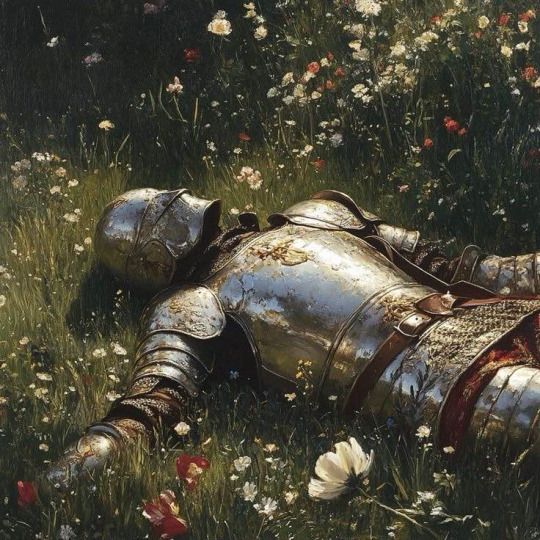
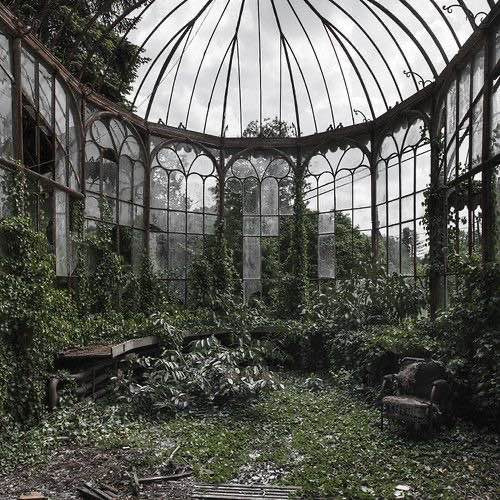



TAGLIST:
@honeybewrites @the-golden-comet @illarian-rambling @ashirisu @urnumber1star
@the-letterbox-archives @48lexr @aalinaaaaaa @thecomfywriter @an-indecisive-nerd
@seastarblue @rae-butter @teamarine777 @caffeinated-starsailor @oliolioxenfreewrites
@corinneglass @thebookishkiwi @storyteller-kara @themongosianhorse @theburningeyeofdawn
@notyourlocalworm @write-with-will @mildlybizarrecorvid @forgottenvalor @huewrite
@vesanal @differentnighttale @plip-plap-plop @olliedoesthings @pupculture
@princessuncertain @mythicalmagical-monkeyman @i-do-anything-but-write @a-zendrial
@real-fragments @lunauphternal @sullymarlowe @aalinaaaaaa @yourpenpaldee
@dangerousbunnyking @milday-dewinter @hoerikwaggo @thestorywitch @simonnebethel
@keeping-writing-frosty @cedence @sodalysm @amor-vivere @lovelyfirebouquet
@shabbyshoebox @creative-creatrues-hub @black-cubes @brightyellowsprite @cosmic-demonartist
@summermaes (ask and ye shall be added)
(tho actually I'mma add everybody who interacts with this post? or put them on my 'just tell me rq if you don't want to be included' list lol)
divider by @thyming
#the faechild original#the faechild navigation#faerie's dawn#story introduction#story intro#lgbt fiction#masterlist#high fantasy#action fantasy#sword and sorcery#fantasy worldbuilding#fantasy world#magic world#diverse characters#lgbtq+ characters#lgbtq characters#lgbtqia characters
65 notes
·
View notes
Text
Came across this call for submissions and wanted to share it with yall! I am in no way affiliated with the magazine, just want to share for anyone who might be interested.
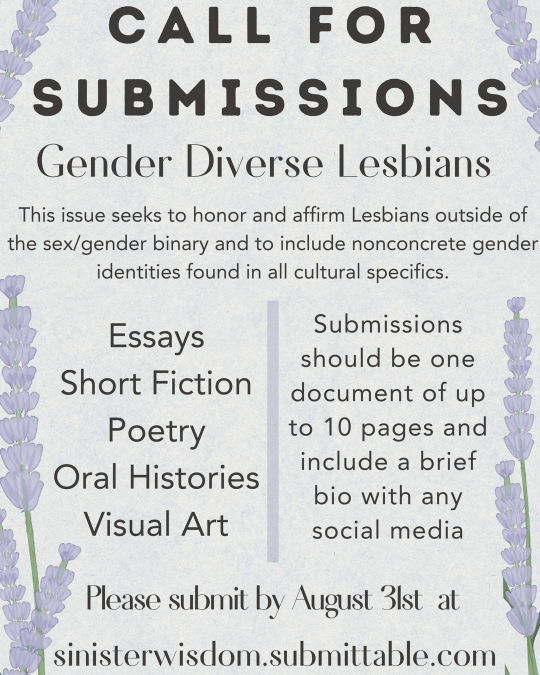
Sinister Wisdom 📣Call for Submissions📣 Gender Diverse Lesbians! This issue seeks to honor and affirm Lesbians outside the sex/gender binary and to include nonconcrete gender identities found in all cultural specifics. We are seeking essays, short fiction, poetry, oral histories, and visual art to be submitted in one document of up to 10 pages, including a brief biography with any social media. The new deadline is August 31st — if you already submitted the first time submissions were opened, your submissions are still being considered and there is no need to resubmit! If you haven’t yet, then please send your submissions through submittable: sinisterwidsom.submittable.com! As Sinister Wisdom is completely volunteer-led, we are unable to provide compensation for contributors, however they will receive a free copy of this issue and a year-long subscription to Sinister Wisdom. Send us your best work! Sinister Wisdom Linktree
#call for submissions#sinister wisdom#magazines#trans#lesbian#gender#nonbinary#queer art#queer writing#queer fiction#gender diverse
218 notes
·
View notes
Text
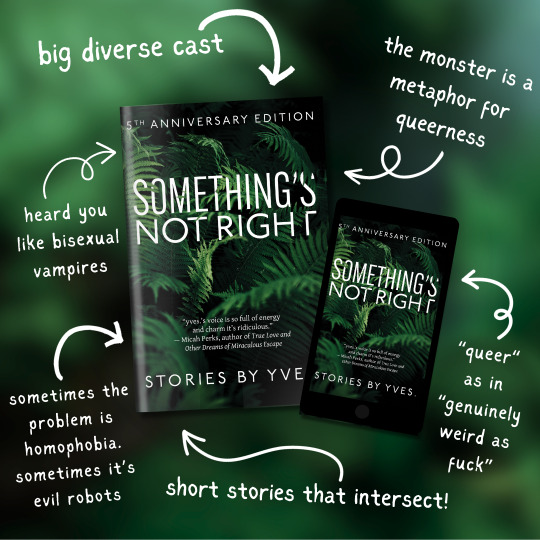
SOMETHING'S NOT RIGHT IS OUT!
“Comedic, witty and chilling by turns.” — A. R. Thompson, author of When Dealing with Wolves
The debut collection returns in a special fifth anniversary edition, repackaged with three new short stories, a new cover, and additional bonus content! A vampire is forced into a compromising situation; a father fears his child's growing plant collection; the undead go to high school; a butcher contemplates whether or not she can be loved. In a captivating debut, yves. opens the door to our world, slightly askew—where the crows work for witches and telephone booths serve as secret channels for prophecy; where a diverse cast of monsters and humans alike are forced to contend with what the world believes is right.
Thank you to everyone who made my weird uncategorizable "Lemony Snicket meets Carmen Maria Machado" speculative fiction an instant bestseller! If you’ve ever felt like a monster, this book is for you.
PRESS: KZSC interview | Santa Cruz Sentinel interview
EXCERPTED SHORT STORIES
BUY NOW!
signed paperback | paperback & ebook (amazon) | ebook (itch.io)
& at all major retailers!
Thank you so much for reading this post about my book. I hope you will share it, and this image of my beautiful black cat, Andy, widely. To queer weird fiction and indie pub! To you, Dear Reader, with love.

#something's not right#snr2#important writing updates#txt#fantasy books#queer fantasy#queer writing#lgbtq books#lgbt books#bookblr#writeblr#writers on tumblr#lgbt fantasy#indie author#bisexual books#queer books#trans books#ownvoices#diverse fantasy#gay fantasy#my writing#kindle books#books#speculative fiction#LGBT books#indie books#Thank you so much to everyone reading this. You've no idea how grateful I am.#Shortened for Blaze 2! If you're wondering.
506 notes
·
View notes
Text
Season of Pride

I am very proud to be part of the Season of Pride steam event this year, and I am even more happy to be features along with other incredible queer devs and games! ✨ Check them out and if it's your jam, wishlist them, it helps so much indie devs like us ❤️

Lock & Key: A Magical Girl Mystery by @vnstudioelan 🌟 Cage of Roses by @ebi-hime 🌹 Of Sense and Soul by @forsythiaproductions ✒️ Canvas Menagerie and Asphodelium by @arimiadev 🎥 Drăculești by @draculestigame 🍷
So don't wait come celebrate over 130 Queer Games with us!
#visual novel#indie game#queer fiction#indie dev#queer games#diversity in games#steam sale#season of pride#season of pride 2024#english otome game
64 notes
·
View notes
Text
I'm teaching a Workshop about Story Structure...
The contents of what I'm basically talking about are there, if you're interested. I'll be adding things like How to beat AI... ('cause I had fun doing it myself.) I won't teach how to write a particular story structure, because that takes a whole lots more work, but I will cover a huge geographical range by trying to get at the heart of what story structure is without being an ethnocentric a-hole. And yes, there will be some European Story structures...
2 notes
·
View notes
Text
Support your indie and nb and trans authors! 60 flash fiction tales from writers from all over the world.
#horror#writing#fiction#books and reading#booktok#spooky season#spooky art#spooky aesthetic#spooky vibes#value for money#diversity#queer community#lgbtq
93 notes
·
View notes
Text

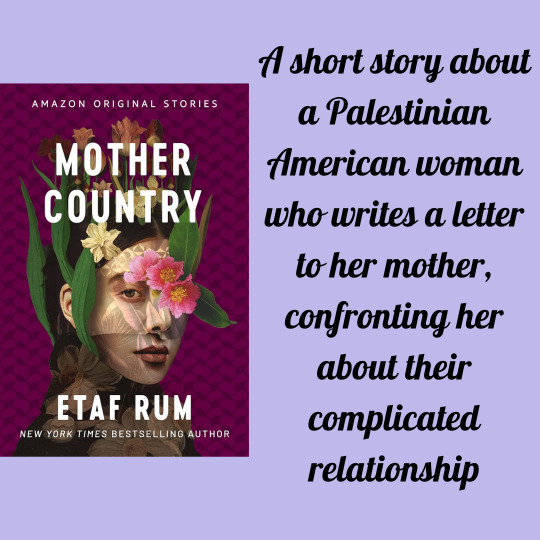

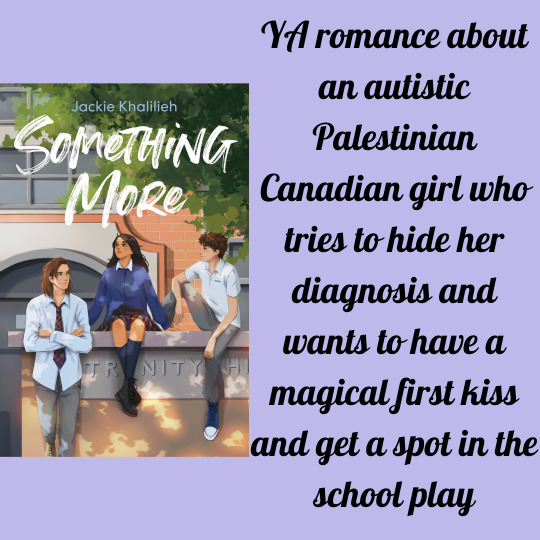
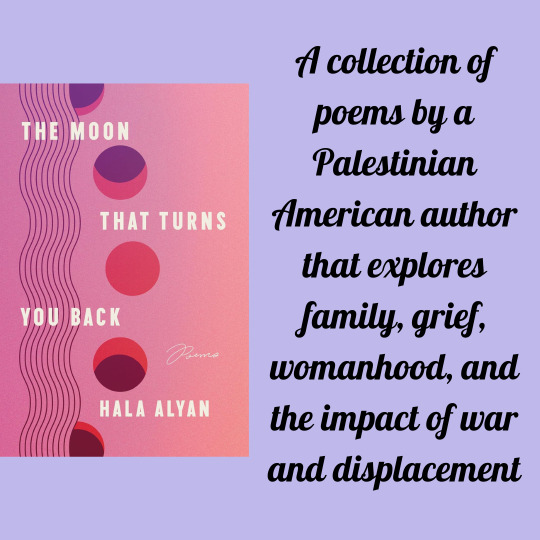
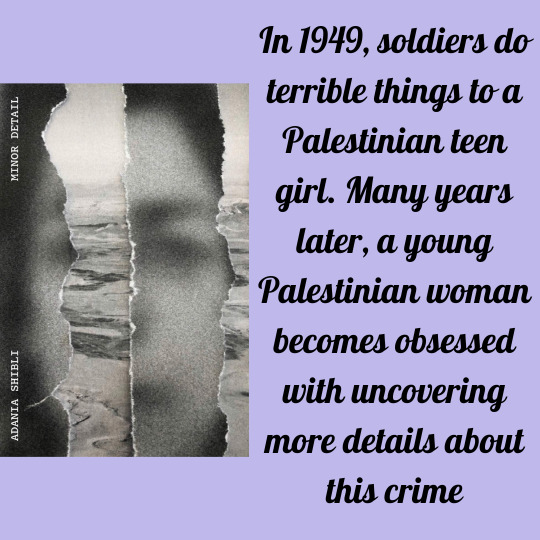
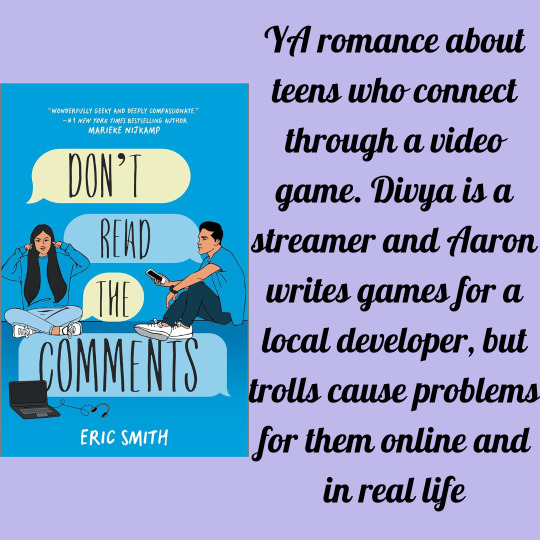
Here are some fiction books by Palestinian authors about Palestinian characters that I've read and enjoyed! Whether it's about living under the occupation or teenage diaspora falling in love, it's important to support Palestinian authors and read their stories, especially as attempts at censorship increase Let me know if you have any recs for me to add to my tbr!
208 notes
·
View notes
Text

We're thrilled to say Of Sense and Soul is featured in this year's Season of Pride Steam Sale! 🌈✨
Come celebrate over 130 Queer Games with us! 💖
A huge thanks to Midboss, IGDA, and Gayming Magazine for highlighting all of us!
If you're looking for more visual novels to wishlist, look no further than a few of our fellow Upcoming Queer VNs! ⬇️

Lock & Key: A Magical Girl Mystery by @vnstudioelan 🌟
Cage of Roses by @ebi-hime 🌹
Imperial Grace by @synstoria 👑
Canvas Menagerie and Asphodelium by @arimiadev 🎥🪻
Drăculești by @draculestigame 🍷
#visual novel#indie game#historical fiction#queer fiction#historical romance#indie dev#gay#queer games#diversity in games#steam sale#announcement#season of pride#season of pride 2024
40 notes
·
View notes
Text
Riot Kings, page 187
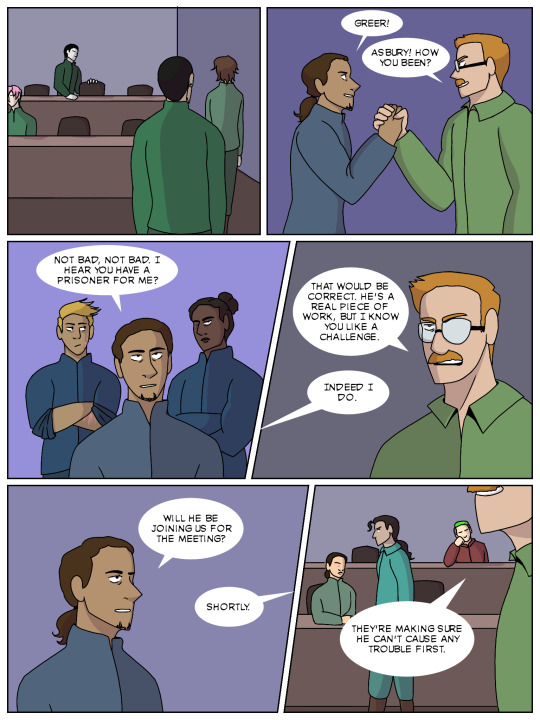
first // prev // next
thank you to @bumbling-a-bee (Mickey, loose brown hair), @3-2-whump (Julio, short black hair), @whumpsday (Kane, sitting down), @grizzlie70 (Luke, pink hair), @whumble-beeee (Declan, rolled sleeves),
and @whumperofworlds (Kiefer, bun) for lending me your OCs! :D
#i had to sketch a seat map for this scene ao I don't lose people *screaming*#diversity win! your government assigned tormenters are gay lovers /hj#doc is on the case#riotkings#187#scifi comic#fictional politics#asbury you're actually a bastard why did i have to kake you lowkey adorable#like a more daddish flynn Rider#I swear it was not intentional#the designs just speak and i have to obey
81 notes
·
View notes
Text
Issue 27 of Amare Fortnightly Bulletin 16/10/24 - 31/10/24 - HAPPY ONE YEAR ANNIVERSARY
Hello everyone,
Issue #27 is here, and it’s a special one! This marks our first anniversary!
We can hardly believe it’s been a whole year since we started bringing you the latest in Amare game releases, announcements, and updates. It’s been an amazing journey, and we’re so grateful to have shared it with all of you and we can't wait to see what else the community continues to create.
In this milestone issue, we're celebrating with a fresh batch of exciting new games and demos, updates on some episodic releases, and a few new crowdfunding campaigns. Thank you all for your continued support over the last year, and we can’t wait to see you again next issue! ~ The Team
Itch Link for Issue Download - https://amaregames.itch.io/amare-new-bulletin-2024/devlog/826307/issue-27-release-oct-16-oct-31-happy-one-year-anniversary







#amare bulletin#amare game#interactive fiction#otome game#visual novel#news#otome#amare#diverse games
70 notes
·
View notes
Text
FAERIE'S DAWN
CHAPTER 2: KILREY (PART 2)
CHARACTERS: ✦ Nova “Me” Fae (pov) ✦ Scamall “Cloud” Fae ✦ Spéir “Sky” Fae
story intro table of contents chapter one < last chapter next chapter >

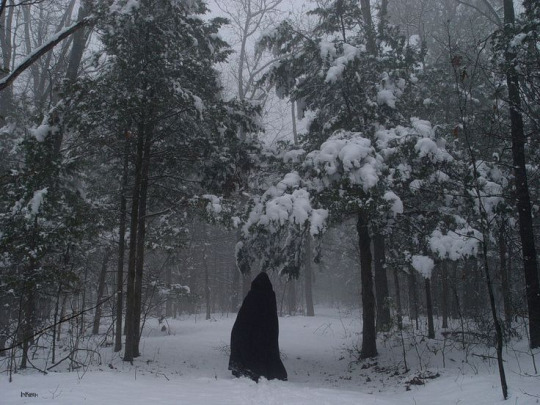

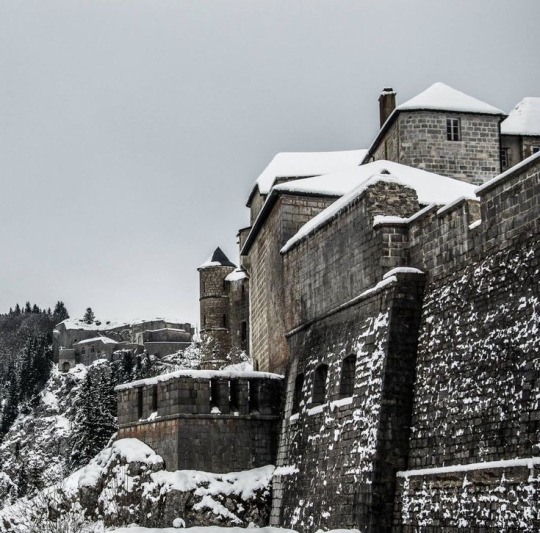

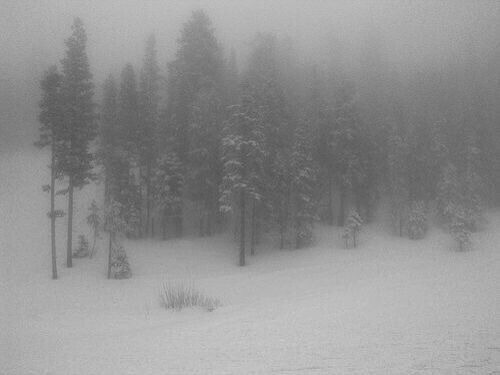

Sky: [suddenly comes to a stop behind them, raising his voice) "YOU WHAT!? You expect us to believe you can take on an archfaerie!?!?"
Nova: [growling, spins on his heel and warps to—]
Nova: [reappears directly in front of Sky, a whole foot taller and gripping the front of the faerie's shirt as he pulls their foreheads together]
Nova: [snarling, practically spits their words out) "stay behind if you want! Die! Because that's what's going to happen! I can save you if you come with me, but otherwise!?!?"
Nova: [can't help it as her rage—and snarl—breaks for despair—]
Nova: [turns their face away, releasing Sky's shirt to reappear in the spot they'd vanished from]
Nova: [doesn't finish what they had to say, crying silently as they instead hurry through the streets]
Faeries: [all holed up in their homes… whether because of the time, or the storm]
Storm: [rapidly growing into a whiteout blizzard, only breaking for flashes of lightning in the distance]
Air: [vibrating and crackling from the electricity, the magic storm, or both]
Cloud: [having taken Sky's hand in hers; voice quiet, but pained) "Sky… look." [points into the air, toward Nova's essence] "That's theirs. Even if they can't fight him… I think they can do something against him…"
Sky: [silent for a moment, but—]
Sky: [lets out a slow, shaky sigh]
Sky: (voice quiet and uneven) "why did you have to get us in this situation?"
Nova: [struggles to ignore them, feeling a wave of relief as they cross the last building of the town… though they still have some distance to go before they've escaped Kilrey's dominion]
Tremors: [slowly seeping from spreading from the air to the ground]
World: [violently rumbling; the air itself is vibrating and full of visible electricity while the ground quakes under the group's feet, breaking the cobblestone road they're trying to travel across]
Road: [except... while it cracks, it doesn't separate. Not until Nova passes. The pieces remain close enough together that the group's able to walk across it—even as it rises in the air and then scatters behind them]
Nova: [almost absentminded in her steps, confident in her magic's ability to keep the stones she needs in place to walk on. Instead, she focuses on collecting what magic she can from the environment and magically watching Kilrey close in on them]
Sky and Cloud: [behind her, use a mix of their own magics to help them hop between the separating stones and stay close behind Nova]
Cloud: [essence suddenly flickers further than before, flinging itself toward Nova—]
Nova: [tenses, immediately warping out of the way of the attack and flipping to face them, but—]
Cloud: [only created a small dome of clear air around them, granting them more visibility through the blizzard in their immediate area]
Cloud: [freezes at Nova's reaction]
Sky: [and tenses, putting himself between Cloud and Nova]
Electricity: [focused around them, sparking and flashing across the air, and making all of their hair stand up on end]
Nova: [heart pounding, looks between the two, the dome around them… and something not far behind the two.]
Kilrey: [catching up.]
Nova: [bites his tongue, tears swelling in his eyes]
Nova: I'm sorry. I'm so sorry. I ruin everything…
Nova: [with only a moment to think, envelops the three of them in his own essence and pulls them outside the bounds of Kilrey's dominion]
Group: [reforms with Sky and Cloud in the same positions as before, but behind—]
Nova: [facing the direction they'd just come from, much more drained from having pulled them all through another's dominion… but shielding the two air faeries with his own body]
Nova: (not even sure who he's pleading with) please don't stab me in the back… please don't make me regret trying to help you… I can't let more fae die because of me… so please don't make me die again…
Nova: (voice unsteady, but raised) "I'm going to take him on. Just run. Even if I can't stop him… you can get away. I'm sorry for getting you dragged into my problems…"
Cloud: (voice uneven) "I—"
Sky: [nope! Takes her hand in his and drags her along, trying to follow Nova's instructions advice]
Cloud: [hesitantly lets him pull her away, taking her clear-air dome with her]
Nova: [heart pounding, stares out toward the concentration of Kilrey's essence speeding toward her]
Nova: (to herself) … you've done this before. You can do it again, Mabh.
Nova:
Nova: [can't help a weak, pained laugh]
Nova: not that one, either… 😅
Rumbling: [suddenly spikes in strength as something speeds toward her—]
Nova: [tenses, quickly throwing up both their hands and a magical barrier to protect themself]
Snow and earth: [bursts forward and out from the ground, flinging itself toward them]
Nova: [skids backwards along with their barrier, wincing as they struggle to keep it from breaking—]
Suspended Snow: [falling in clumps from the air, reveals the faerie that'd punched through the blizzard like a bullet… Kilrey.]
Kilrey: [8 feet tall, almost twice Nova's height, and towering above them. Has far-too long limbs all covered in thick, dark brown fur and tangled plants; standing atop hooved, satyr-like legs; has stag-like antlers branching from an elongated face; and covered in moss and plants that're woven into his fur]
Kilrey: [grins widely as he looks down at Nova, eyeing them through the pink-tinted barrier]
Nova: [breathing heavy and struggling not to cry, but steadily stands back up straight, hands still crossed in front of her as she holds up the barrier]
Kilrey: (voice low, almost like a growl, and yet gleeful) "ah… you know, Silina tried lying about what you were…"
Nova: [still wincing, takes the opportunity to strengthen her barrier]
Nova: (to herself) no surprises there…
Kilrey: [reaches down, trying to shove his hand through the barrier]
Barrier: [blocks it just fine!]
Kilrey: [—monologue only interrupted by a laugh) "but when your essence built… I recognized you, Dhia…"
Nova: [winces, only now realizing their stuffing themself full of ambrosia backfired by making themself noticeable… while they'd gone in with such little essence in order to hide]
Kilrey: [as he spoke, tightened his furred hand—and essence—around her barrier]
Kilrey: [and, finally, shatters it in his palm]
Nova: [thrown back from the force of the collapse, skidding into the ground and getting buried into the snow]
Nova: [already incredibly drained, but… struggles to focus their essence on his, trying to find the weak points they'd noticed the last few times they'd tried this]
Kilrey: [as they did, leisurely walked through the snow, stopped in front of Nova, and finally leaned down to pick them up by the throat]
Nova: [half-gasps, half-sobs, grasping at his hands as though they had anywhere near enough strength to pry themself free]
Kilrey: [and all the while, smugly) "I can't believe you're still alive… I'd heard you died, Dhia."
Nova: [just stares up at the blizzard-tainted white sky, struggling to breathe and focus—]
Kilrey: [slowly begins sapping their magic, drawing out his words as he does) "let me relieve you of—"
Kilrey: [suddenly falls silent, the strength fading from his fingers]
Nova: [tears himself from Kilrey's grasp and falls to the ground, gasping for breath as they glare up at him]
Nova: [tightens their magic around his soul, snarling as best he can]
Nova: (words as strangled as his voice) "'relieve me of my power?' You piece of shit, you really think it'd work this time!? When everyone else has failed!?!? WHY ARE YOU ARCHFAE ALL SO FUCKING EGOTISTICAL!?"
Nova: [digs his essence into Kilrey's soul like knives, unsteadily rising to his feet and taking shaky steps toward Kilrey]
Kilrey: [completely frozen in place, face blank and unable to move… because Nova had broken his will, like every faerie was capable of doing.]
Nova: [had just needed him to let his guard down, to give them the chance to work their way through his protection]
Nova: [glares up at his blank face with a snarl… and tears still in his eyes]
Nova: (voice hard and hateful) "but I'm merciful. And you're useful. So here's what we're going to do. Kneel."
Kilrey: [face still empty, obliges. Lowers himself onto one knee, kneeling in front of them… and barely getting low enough that Nova can look down at him]
Nova: [reaches forward to grab him by his throat with a vicegrip and force him to meet her eyes]
Nova: [still snarling, all but spits) "you're going to go back and erase all memories that I was here! You're going to go back, tell Silina that I managed to escape you and fled South, make sure nobody leaves town for a week, and then you are going to forget all about me! You'll forget I exist, you'll forget I wiped your memories, and you'll FORGET YOURSELF!"
Nova: [left gasping for breath, glaring down at him with tear-filled eyes… before her face finally breaks]
Nova: [half-sobbing, brokenly) "understand?"
Kilrey: (tonelessly, breath slightly strangled… but only slightly) "yes."
Nova: [releases Kilrey's throat, taking a few shaky steps back]
Nova: (weakly) "good. I've given my commands. Now, fulfill them."
Nova: [finally releases their magic on him, letting her feet collapse under her]
Kilrey: [rises smoothly, then promptly twists on his heel to tread back into his dominion]
Nova: [cries softly, watching his back slowly get further and further from him… because the blizzard's largely died away, taking the whiteout with it]
Nova: it never works… won't you guys stop TRYING!?
Nova: [gasping for breath again, falls back to stare up at the beautiful, star-filled sky slowly shining through the fading blizzard]
Nova: … why couldn't I just be a normal faerie?
Nova: [closes his eyes, unable to stay conscious]

So... what's on your guys' minds? 👀
Any theories? 😉
story intro table of contents chapter one < last chapter next chapter >

Faerie's Dawn taglist:
@honeybewrites @the-golden-comet @illarian-rambling @ashirisu @urnumber1star
@the-letterbox-archives @48lexr @aalinaaaaaa @thecomfywriter @an-indecisive-nerd
@seastarblue @rae-butter @teamarine777 @caffeinated-starsailor @oliolioxenfreewrites
@corinneglass @thebookishkiwi @storyteller-kara @themongosianhorse @theburningeyeofdawn
@notyourlocalworm @write-with-will @mildlybizarrecorvid @forgottenvalor @huewrite
@vesanal @differentnighttale @plip-plap-plop @olliedoesthings @pupculture
@princessuncertain @mythicalmagical-monkeyman @i-do-anything-but-write @a-zendrial
@real-fragments @lunauphternal @sullymarlowe @aalinaaaaaa (ask and ye shall be added)
dividers by @thecutestgrotto and @saradika
#the faechild original#the faechild writes#the faechild outlines#faerie's dawn#fd outlines#nova “me” fae#scamall “cloud” fae#speir “sky” fae#nova's domain#script fic#faeries#the fae#faerie#fae folk#fae#faecore#fey oc#high fantasy#action fantasy#diverse characters#fantasy world#poc in fantasy#lgbtq+ characters#lgbtqia characters#lgbtq characters#neurodivergent characters#fantasy#fantasy story#fantasy writing#lgbt fiction
24 notes
·
View notes